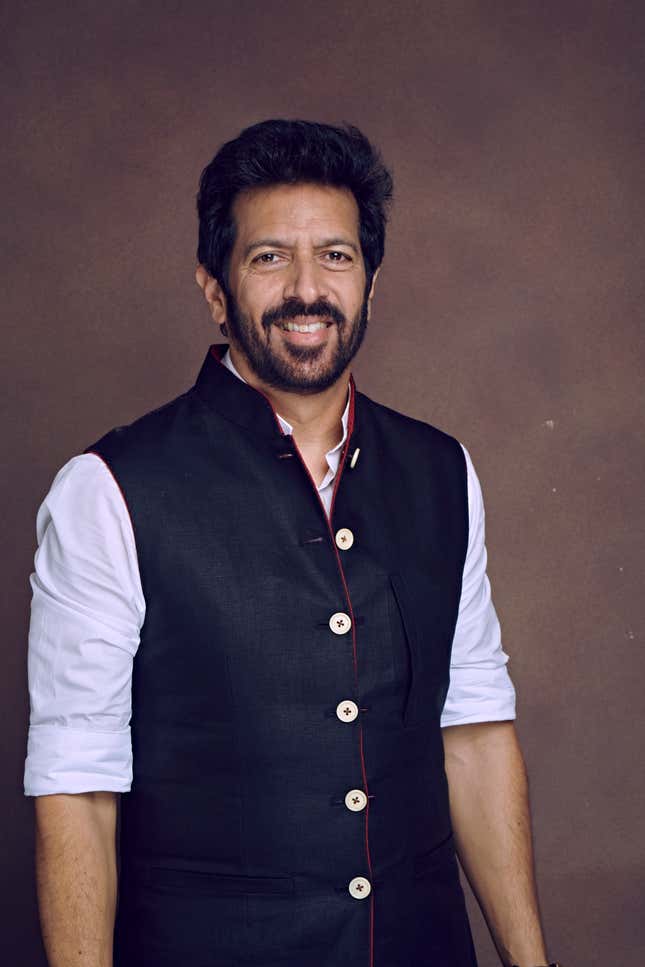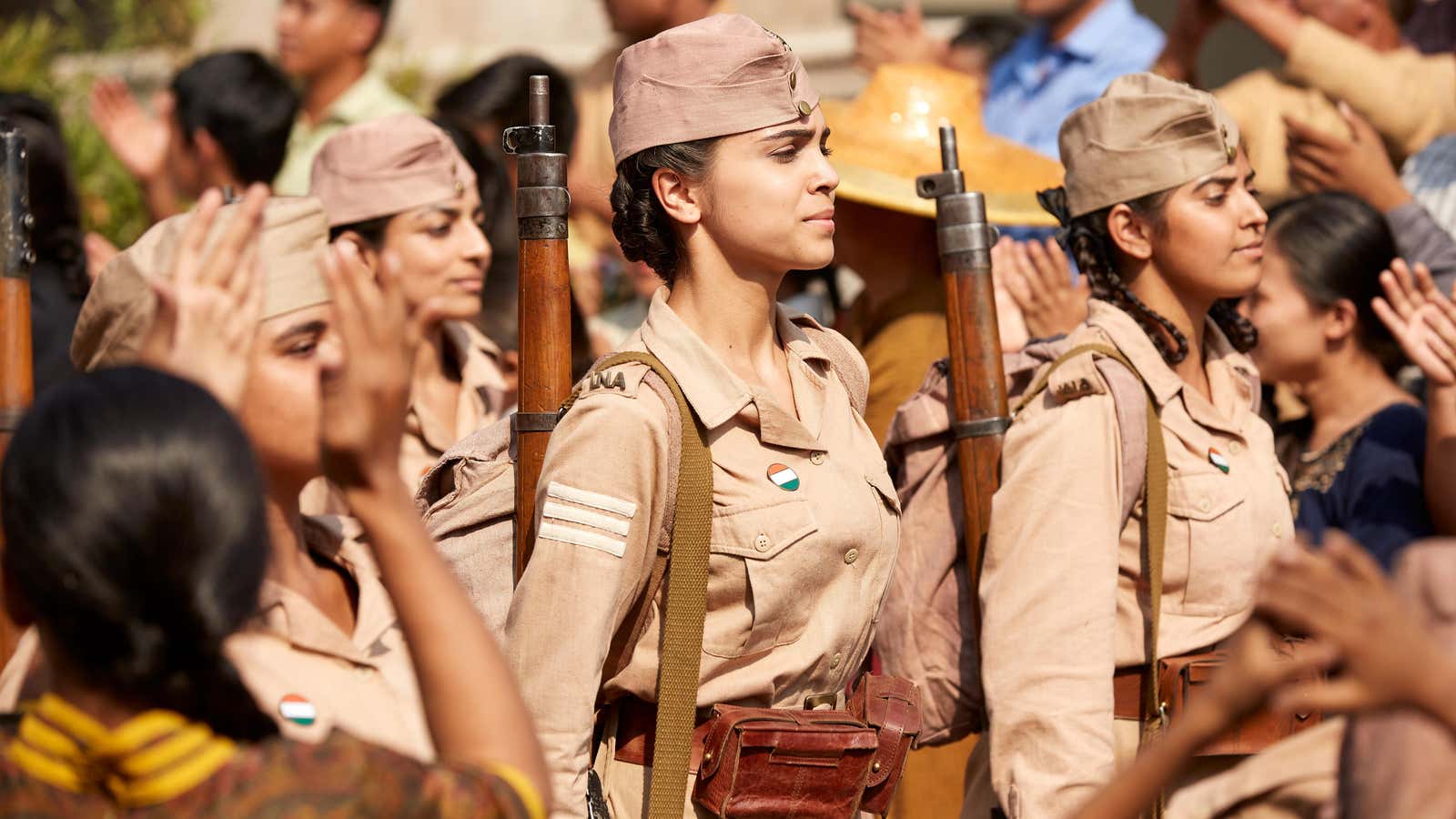Indian over-the-top (OTT) streaming platforms have managed to woo some of Bollywood’s biggest names to create content for them.
The latest entrant in this universe is filmmaker Kabir Khan, whose The Forgotten Army starts streaming on Amazon Prime today (Jan. 24).His debut on streaming platforms follows the success of filmmakers such as Zoya Akhtar (Made in Heaven), Karan Johar (Lust Stories), and Anurag Kashyap (Sacred Games).
Taking off from a documentary he made 20 years ago, The Forgotten Army is about the foot soldiers of the Indian National Army who sought to overthrow the British Indian government after World War II. The lesser known story of the Rani Jhansi regiment, the first female infantry regiment in the world, forms the core of the narrative.
The filmmaker, who has experimented with formats like documentaries and full feature films, believes the web series is just an other narrative style. “At the end of the day, we are storytellers, and it’s the story that matters,” he told Quartz.
In an interview, Khan spoke about the perils of censorship, the idea of free speech, and what went behind recreating The Forgotten Army. Edited excerpts:
History can often be tricky and heavily contested in films about war. How do you navigate those narratives?
In The Forgotten Army, I was told the story by the people who actually created history. It goes back to an (eponymous) documentary I made 20 years ago, for which I met Captain Lakshmi Sehgal, who commanded the Rani Jhansi regiment in the INA, and Colonel Gurbaksh Singh Dhillon, a senior officer in the INA and the sole surviving officer among the three who were put on trial at the Red Fort in Delhi. They were both 86 at the time, and I took them back to the scene of the action, drove from Singapore through Malaysia and Myanmar, retracing the route that the INA had taken during World War II.
The series is through the eyes of foot soldiers. It’s not really about the leaders.
A lot about the INA is shrouded in mystery, even though many of the government documents have now been declassified. Was it hard to research a subject like this?
The parts that are shrouded in mystery and the conspiracy theories have mostly been related to Netaji (Subhas Chandra Bose, who led the INA). As far as the army itself is concerned, it’s not really a mystery, but a simple lack of information. As the old saying goes, “History is written by those who win wars,” and that is what happened with INA. When the British Indian Army was finally taking back Burma (in 1944-1945), they took soldiers of the Azad Hind Fauj (INA) as prisoners, and destroyed their diaries. All we have is British military historians’ accounts.
Most of your films have some element of either war or conflict. Why the fascination with this genre?

Ultimately, films are about human behaviour. In times of conflict or war, human behaviour becomes extreme, more interesting and more dramatic to engage with, and put together in a story. So yes, I suppose sometimes my films depict conflict as large as the war, like in the case of The Forgotten Army and Kabul Express, or it could sometimes be the conflict in the mind, like in Bajrangi Bhaijaan where the rift is between nations and an unfounded hostility between people. I let this backdrop have a bearing on what is happening to the characters in the film.
How different has creating a web series been from making a full feature film for the silver screen?
There isn’t much of a difference. There was a newer approach while I was writing it. I wasn’t writing a film screenplay, which I’m used to, but a story that needed to have four break points in it for the five-part series. At the end of the day, we are storytellers, and it’s the story that matters. And certain stories lend themselves to a longer format, like a series.
Sometimes we make too much fuss about big screen versus small screen, or OTT versus silver screen. We also have to face the fact that in the internet age, most of our films are being consumed on the internet, and mobile phones. For me, the narrative is decided by the story, and not the platform.
Censorship and certification are big hurdles to cross while making feature films. Is that an advantage OTT platforms have, and do you worry about calls for censoring digital content?
I feel the whole concept of censorship in this day and age is ridiculous. The censor board, as we call it, is actually a certification board, and that’s what it should be doing. If you feel something is not appropriate for a certain age, give it that certain rating. Create more ratings instead of just having U, U/A, and A.
It is refreshing as a filmmaker to not have censorship on OTT platforms. Having said that, I don’t think we should indulge in things for the sake of sensationalism. That will become a reason for the authorities to crack down and censor.
The flip of censorship is free speech. How do you work through that while choosing the subject and narrative of your films?
Ultimately, censorship is about filmmakers’ sensibilities and what they’re comfortable with. That’s the one filter you have to pass as a filmmaker—you, yourself, and your sensibility. You have to evaluate if it will hurt sentiments, or be deliberately sensational. I don’t think one should over-analyse everything that one is putting out, because then it would become impossible to create a story. Somebody is likely to get hurt, even when you don’t want them to, because we live in an oversensitive age and people are not willing to see anything that contradicts their views.
Web series and films don’t come with box-office numbers. How do you measure success?
I think box office alone does not give you a full picture of success. It is about how long your film is spoken about and remembered. A film can be (deemed) successful if it reaches a smaller audience and has a huge impact on them. On OTT platforms, you can only judge the success through conversations and discussions.
This year, Netflix received a phenomenal number of Oscar nominations. Do you see the trend being replicated in India?
When you say award functions, I instantly get a sense of boredom. I am not for award functions, though it is great to recognise people for their work. In our country, award functions have a tendency of becoming tamashas (grand shows).
